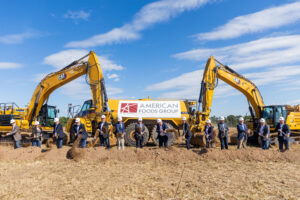Editor’s Note: Any views expressed here are my own and do not necessarily reflect those of the wider AgFunder or AgFunderNews teams.
Stepping into a food systems conference can sometimes feel like entering a school cafeteria, albeit one with higher stakes and more intense debates.
At one table, you have the vegan influencers in all their glory. Across the way, an energetic tech-forward group includes venture capitalists, technologists, and entrepreneurs who are further divided into subgroups like cell-cultured meat enthusiasts, indoor agriculture aficionados, and digital farming pioneers. Then there are the plant-based campaigners for the global south, fervently discussing the need for a more equitable food system.
In the corner, regenerative farmers and their crew swap stories about soil health and holistic land management. And let’s not forget the journalists — the ones who should be unbiased but often dart from table to table wearing their agendas on their sleeves.
Until the last few years, this agrifoodtech cafeteria has been relatively harmonious, with industry players eagerly supporting one another. There weren’t many of us here, so we celebrated new entrants and promoted each other as we tried to grow the pie for everyone and build an ecosystem that would attract more investors, bright mind entrepreneurs, policymakers, NGOs, and influencers.
“Look at us all over here! We’re trying to save the world!”

From high-fiving to low trolling
That link between food and saving the world was expertly promoted by plant-based alternative meat company Impossible Foods, which made waves with its slogan, “Eat Meat. Save the Planet.”
Impossible’s campaign proved effective, garnering significant funding and sales, and even helping its closest competitor, Beyond Meat, achieve a $9 billion valuation in its IPO. This was groundbreaking stuff for agrifoodtech, a niche part of the venture capital universe where we’ve seen very few unicorns and exits to date.
But as time has gone on, the once-unified big table has begun to resemble a chaotic food fight straight out of a high school movie. Just glance at the LinkedIn posts of a regenerative farmer or a plant-based meat alternative company and see them go at each other in the comments about the role of livestock in climate change or the health profile of meat alternatives. Our global foodtech editor Elaine Watson is regularly trolled on LinkedIn when she posts articles on alt protein. It’s petty and lame.
But it’s not just regen ag versus plant-based. At the Edible Planet Summit in Umbria last autumn, a heated argument broke out between a regenerative farming proponent and a vertical farming champion, the former taking a very purist stance on the latter’s lack of soil use. Then there’s the fight between gene editing and regenerative and organic farming advocates.
We’re even starting to see in-fighting in the regenerative community between what one investor recently described to me as “deep regeneration” – shifting power in the food system to local communities and farmers, bringing in cultural and socio-economics dimensions as much as carbon, nature, water and soil — and practice-based, often corporate regenerative agriculture.
There’s also a group that doesn’t even like the phrase “regenerative agriculture,” instead preferring “agro-ecological.” The list of tensions and niche spin-off groups is almost endless.
Agrifood purism is unhelpful for our climate and social crises
Of course, there are valid points to be made.
Maybe vegetables grown without soil won’t have the same nutritional profile as those grown in it. Maybe the promise of regenerative agriculture is not 100% science-backed yet, and in many — but not all — cases it does support the raising and slaughter of cattle. And yes, many plant-based meat and dairy alternatives are using monocropped ingredients and we don’t know what may be missing nutritionally from extruded or cell-cultured ingredients.
We certainly need this nuance as we look at the future of our food system and the potential for unintended consequences.
But a lot of these things are still maybes, and no one solution is going to scale overnight. In fact, we’re going to be eating real meat for decades to come, along with produce grown outdoors in soil. The alternative protein sector will continue to innovate and improve before it captures significant market share. And we’ll gather more data about regenerative ag-based carbon sequestration.
Often you see both sides of the debate argue that the solution is mutually exclusive. This feels akin to cancel culture but for farming and food production practices rather than people.
Why can’t we have both regeneratively raised real meat as well as cell-cultured alternatives? Why can’t a crop that’s been genetically edited to withstand drought or present a higher nutrient content be used on a regenerative farm?
Taking an ideological stance is certainly the sexier route, as Tamar Haspel and Mike Grunwald, two awesome journalists discussed on their podcast Climavores: “Journalism isn’t as sexy as tribalism. Right?”
Enabling systems-level transformation
The problem is that if we do not collaborate on the issues, we will not create the systems-level shifts the food system needs to adapt to climate change and solve its social problems in the immediate future.
And in case you didn’t know, those are no longer tomorrow’s problems; it’s also not just about the climate as we face increasing health crises globally.
Technologies certainly have the potential to disrupt industries, and there are several amazing startups out there that I truly believe will make an enormous impact in their part of the sector. But that’s just it; however big their ambitions and potential, they will always be one part of the wider industry and numerous global systems. Agrifood is a global, complex, nature-based industry at the behest of weather, climate, corporate control, and more. It needs a multi-pronged approach to enable true transformation.
For example, to mobilize the world’s farming communities to transition to more ecological practices or even shift away from animal agriculture altogether, governments, the private sector, and the non-profit sector will need to work together to ensure farmers can access the financing, the know-how and the tools they need to do so. Similarly, providing improved, local access to high-quality food, and reducing food waste, will necessitate a multi-stakeholder approach.
The more the agrifoodtech categories engage and collaborate with one another, the more quickly they might discover what works and what doesn’t at a systems level. And they might just be able to help each other — one person’s waste stream is another person’s gold mine et cetera.
Leave cancel culture at the door
If you ask most people why they’re working in our niche category, they will say it’s to improve the food system; to fight climate change; to have a positive impact on people’s lives.
Just because they’re doing it differently doesn’t mean it’s wrong or that there isn’t space for it alongside what someone else is doing.
They will also no doubt agree that the agrifood innovation industry is still way too small considering its importance.
I’ve been mulling this article since last September when I attended a summit in Italy but have been hesitant to put it out for one reason or another, and certainly for fear of trolls from all angles. And then just today I got the confidence to push it out after I listened to the last episode of Climavores. Tamar Haspel, who comes from the perhaps more techno-optimist side of the tracks, concluded the episode with this:
“And so I guess what I would like is to make the tent bigger, too, to get more people on the bus of some of these solutions that show some promise to see if we all can’t try and leave our ideology at the door to try and look at these in as clear-eyed a way as we can.”
So this is not a call to stop debate or criticism; far from it. It is essential that we test opinions and assumptions to continuously evolve our thinking. Competition is also invaluable in ensuring innovations and businesses constantly improve.
It was good to see UK journalist George Monbiot and regenerative agriculture pioneer Allan Savory engage in a formal debate (of sorts) just yesterday in Oxford, UK, after an aggressive and increasingly unpleasant Twitter exchange over the past few months. And while I wouldn’t say the debate was a success, it was a formal recognition of and respect for the other person’s opinion. It was also a realisation of how differently two people can think about the same topic.
But instead of well-mannered critique and respect for diverse and opposing viewpoints, I am increasingly noticing — and I know many of you are too — too many people across factions of our industry refusing to accept the role or opinion of those from another side. Not only is this akin to cancel culture, but it’s the opposite of progression. It’s off-putting to those looking in on our niche space and it’s dangerous territory when it involves our survival.
So this is a call to be more open-minded; to find common ground; to be civil; to celebrate our differences; and to stop the childish food fight!





